I'm not going to lie: the future scares me. The only thing more certain than my fear is the knowledge that I'm not alone in it.
Every day after a certain point in my life (a point that's proving exceptionally difficult to pinpoint), I began taking future quandary seriously. And what I saw...I didn't like.
It wasn't that I didn't have a future. I was always certain I did.
It wasn't that it was going to be difficult that I didn't like. I enjoy challenges, regardless of whether they're even relevant or necessary, or even worth pursuing in the least. A challenge is a challenge, and I'd climb a mountain just because it's there (except I wouldn't actually. I'm terrible with climbing).
No, what I didn't like was its murkiness. I always thought about it this way: to me, no way of dying is more terrifying than death by shark attack. I could be mauled by a tiger, fall out of a plane or cliff, or get hit by a truck, but just the thought of being consumed by a shark...well, it gets me in a way I'm not often got.
Why? Because up until they set their jaws in your skin, you don't see them clearly. You only see a silhouette distorted by the waves, unless you're looking at them through goggles. But regardless, it's that uncertainty of form that carried with it terror, dread, and a death less than ideal.
And so it is with the future. It's murky, and always will be. It was back then when I first began wondering about it, and it is now, even at the start of my graduate studies (although not so much the start anymore).
Will it ever be different? Will I ever have the certainty and comfort in knowing the future? Conceivably not.
I always hated leaving things in the hands of fate. But, ultimately, such things may just be out of our hands, no matter how much we struggle to control our world. Although I'm still on the fence on whether I'd prefer fate or absolute chaos (I have my theories that you either have one or the other, but that's a discussion for another day), maybe my notion of control is just an illusion...
Fine, I can live with that. But dammit if I'm going to surrender my autonomy without first dying for it.
So Wikileaks is sort of a mess, isn't it?
People are up in arms.
"Anonymous" is on the march.
The internet's usual wild west nature just took on a whole new feel.
At the risk of falling prey to the internet wolves, I'm going to go out on a limb and say that...I don't really like anyone in this mess.
I dislike Wikileaks.
I dislike Julian Assange.
I STRONGLY dislike censorship.
I just as STRONGLY dislike Anonymous.
I don't have a side. I just think you're all stupid.
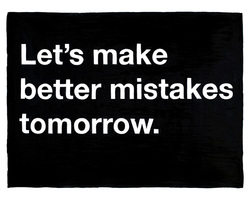 I hope they are better mistakes. Today's mistakes suck. I sit here on the 4th floor of the Folsom Library at RPI, overlooking the quad, with its trees and people waving and walking their respective ways. It's been about 3 months since I first stepped off the plane in Troy, NY, and I still remember that day pretty clearly.
Obviously, the steps I took off the tarmac that day were ones I should have been prepared for, given that I had an entire summer to prepare myself for it. Preparation is one thing. Implementation is something entirely different. It's what separates watching "Jackass" from actually landing in the hospital.
So it has come to pass that in the blink of an eye, I've been here for a while now. I once thought that the time it took to complete a Doctorate felt like an interminable amount of time. I've since come to re-evaluate that stance, having dipped my feet in the academic pool for long enough. The life of an academic is a rapid one in this stage, and with its flow leaves a lot of uncertainty in the air. In a profession that treasures good questions, it's often the questions outside of our research that can be the most damning.
When will I finish my PhD?
When will they figure out that I am in fact an idiot and tricked them into accepting me?
Where will I do a Post-Doc?
Who in their right mind would accept me as a Post-Doc in the first place?!
...am I missing the most valuable part of young life by spending it holed up in a lab?
There are a lot of mushy ways to define meaning. As a lexical semanticist, I can think in starkly academic terms the meaning of...meaning. But as a human being, there is a lot more weight to the word than can be lexicalized. At least formally.
So let's consider for a moment what I mean when I say "meaning." When I apply the term to the overall human experience, it pertains to something that gives a moment, a period, or a lifetime something of importance. Thus, meaning to me is considered at least in part to be temporally relevant. It is as temporally relevant as the fact that when we walk, there must be one step that occurs after each step, and ongoing until we decide to stop. It doesn't matter how far we can break down our experience over a lifetime, the meaningful things are always there.
Finding meaning is perhaps even more difficult than defining it. Perhaps it's one of those "I don't know what it is, but I know it when I see it" kinda deals. The good thing about this approach is that it relativizes what is meaningful to a person to the person itself. Thus, there are many approaches to life, and meaning comes to everyone in unique ways, as it is uniquely defined by that individual.
Regardless, I still feel as though meaningless acts and lives are not uncommon. Perhaps it is difficult, even impossible, to judge fairly the way people search for meaning in their lives. Regardless, if one didn't have some notion of what they felt was a waste of life then they wouldn't be able to guide any of their important decisions, much less themselves live a meaningful life under their own definitions.
So I judge...it's impossible not to. And it does sadden me a bit to see people sometimes surrender the desire for a meaningful life, and waste time with meaningless actions.
But these judgments are all through the eyes of ones own definitions, and are implicitly unfair as a result. What's important is realizing this, and understanding there are many different ways people find meaning.
I'm certain someone out there after all finds the way I've chosen to live my life is meaningless and wasteful (anyone who's ever criticized me for selecting Philosophy as a course of study would agree). Ultimately, you can only shake your head, and hope they themselves realize to see things through your eyes.
It'll never happen of course, but it's a nice thought.
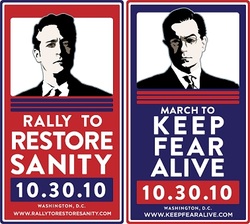 I was originally intending this weekend to attend the rally being staged in D.C. this weekend, hosted by Comedy Central personalities Jon Stewart and Stephen Colbert.
Unfortunately, I was unable to head down to D.C. due to a list of items I need to do here (graduate school isn't all fun and games). So, instead, I am working out of one eye, and watching the live web stream of the rally out of my other. Multi-tasking? Like a boss.
That being said, the intention of the rally is, as you could infer from the titles (and taking into account the tongue-in-cheek character of Stephen Colbert), is to call us back to reason. It seems we exist in tempestuous times with an ever more polarizing political climate. Midterm elections are coming up, and for Democrats it appears as though the shift in power to their side may be rapidly coming to a close, if not now in the near future.
The many people who first helped place many Democratic leaders into power in the first place are disillusioned, the magic that permeated the 2008 campaign wearing off to reveal a pumpkin.
I hate to say I told you so, so I won't. But for us who do prefer sanity, as the rally mentioned above hopes to bring back to the forefront, it was easy to predict this. Let's start at the top: President Barack Obama.
Many of us who supported Mr. Obama during the 2008 presidential campaign made him to be some kind of god. We portrayed him as Superman, one capable of things never before accomplished. We thought him a legend before he had actually accomplished anything at the presidential level, and we annointed him based on potential rather than accomplishment.
It was, to me, insane.
I supported him, and I thought him the best candidate for the job. But the people on his side were simply, for lack of a better word, insane. I just wanted to take so many people by the lapels and shake them, and tell them "No! He's only a man!" Albeit a good one, and well qualified for the position of president.
Unfortunately, it's insanity that helped put him there, rather than real, honest assessment of who he is and what he can do. Please, put away the capes people. You elected a man, not a god.
In these times, we could all use a little bit more sanity, and that applies to all people in all parties. For those people who still think Obama's a god (and I suspect there are fewer of you now than 2008): be reasonable! For those who flip flop from one extreme to the other: be reasonable!
People aren't gods. Neither are they demons. I assure you, Obama can't save the world with his power. At the same time, I assure you, John McCain would not have destroyed the world had he been elected. George W. Bush was not the spawn of satan. Dick Cheney is not an American mini-Hitler. Rush Limbaugh in my opinion is still a douche, but he's entitled to his opinions.
Regardless, let's be reasonable for once. And have reasonable expections as well.
 When one looks in the mirror, a typical concern is the appearance of aging. Little wrinkles that appear at the corners of our eyes and mouths, paths formed along your face by the constant treading of facial expression. A little reminder of the unavoidable: you're older than you were yesterday.
I have a little bit of the opposite of an issue: I look very young. Relatively speaking, I am still young of course. However, compared to what one expects of someone my age, I still look, well, like an undergraduate still trying to work out the most efficient paths from the dorm to campus.
It is the source of great amusement though. Sitting next to the emergency exit doors on airplanes I have been asked on multiple occasions "Sir, are you over 15? Because to sit there, you need to be over 15." I can coolly respond with a chuckle that I am, indeed, over 20, and people more often than not appear taken aback by that fact.
I still get carded at bars, as you would expect, and I imagine I will continue to be carded until I'm well into my 30's.Amusement aside, I do wonder whether my youthful appearance can be a double-edge sword. For all the visually appealing things that come with having a face that seems as though it belongs to a much younger person, certain professions seem to accord respect and achievement with how much wear and tear a face bears. Many people want to see a colleague whose appearance reflects "venerability," where battle scars take the form of wrinkles and crows-feet lining ones skin. One who doesn't look the part of serving in the trenches is doubted to have actually done the time in the trenches, and sadly can be treated more like an unwanted dilettante until further notice.
Maybe I should grow facial hair...
This will be a very short post, but sometimes I feel that saying things, even small things, can force us to treat them with adequate weight when looked upon in the future.
In my recent consumption of literature, I've been already exposed to a dazzling array of concepts ranging from the sensible to the insane. Academics are extremely creative people (contrary to the popular perception of the stuffy old professor living in the past), and the results can be absolutely mind-boggling.
In many of the ideas I've run across thus far, there is always a little bit of an air of "ad-hoc"-ishness about them. There is a particular problem or set of problems, and we develop solutions to address many of them in as succinctly a manner as possible.
The result often times is a feeling that these solutions will only address these particular problems, and when other related problems crop up the presented solution will fail to account for them appropriately. Fundamentally, it is an issue of scalability.
What's more, we try to give our solutions a theoretical basis so that we can more adequately defend them against charges, and hopefully allow us to use this theoretical grounding to address the aforementioned problems yet to be conceived.
The results we create are what I've termed "Brilliant Bullshit," creative and intriguing answers to difficult questions seemingly dragged out of mid-air that may or may not account for even slight modifications or additions to the original set of problems the solution was intended to address.
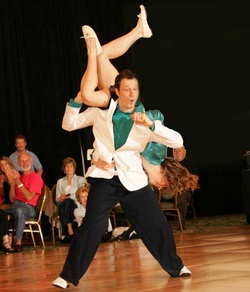 This is not me. So, once upon a time, I knew how to dance.
Well, sort of. I was on the ballroom dancing team at the University of Michigan. What that equated to was being lumped in with a bunch of goods with significantly more skill than I, and trying desperately to keep count with strange music. Good music, but it's not what you hear on Top-40 radio.
Which is sort of a good thing. I'm not much a fan of annoyingly loud techno anyways. This music at least has a point.
Anyways, a couple of my friends from the grad program persuaded me to join them for an introductory lesson for Swing dance. I was reluctant at first, as it's been a long time. I wasn't that good to begin with, and you know what they say about dancing: if you're no good, better not to get on the dance floor at all. Who says that exactly? I don't know, but it seems like sound advice.
After mulling it over in my head for a while, I decided why the hell not. This form of swing, called "Lindy Hop" if my memory serves me correctly (as it so rarely does these days) is a bit looser than the other forms of dance I've picked up a background in, especially compared to Waltz.
This kind, on the other hand, is much more about having fun and feeling the beat as opposed to trying to look good for a judge. Much more my speed to be honest.
I had a blast. Kids, if you ever get persuaded to give some kind of dance that's not club dancing a shot, take it. You'll be surprised how incredible an experience it is. Not only are the people fun, interesting, and very understanding, they aren't inebriated and grinding on you like they want to mother your babies right on the dance floor.
This is about rhythm, this is about feel and understanding your partner. It's trying to form a connection through steps, the common ground you find in the beat. There is a much deeper form of movement going on than a lot of other experiences.
Plus, it's a great test of self-confidence.
There was a girl standing by the side, clearly skilled as a dancer, but painfully shy. I remarked to my friend "Someone needs to dance with that girl...the look on her face is making me a little bit sad."
He responded: "You do it."
It took a while, but I finally went over there and spoke with a cocky grin on my face: "Do you need a partner? So long as you can put up with my incompetence, we can dance." :-D
Yes, the last sentence was in stark opposition to my facial expression. But by this time, I was just having a blast, so I couldn't care less what my words or face said.
I then proceeded to fulfill my own opinion on my dancing ability, and look like a complete jackass. Was still fun though, and I got to pull off the famous movie scene where the guy leaves the girl on the dance floor with a mysterious dash and persona.
It's all very cloak and dagger in my mind. In everyone else's mind however, it probably just looked awkward.
Whatever.
Point is, swing dance, ballroom dance, all of these kinds of dances that so many people think are "lame" and not modern enough really should give it a chance. Trust me, the experience of club dancing is nothing compared to a lasting impression one leaves when one can dance, you know, actually well.
And the best part: there's no annoyingly loud techno.
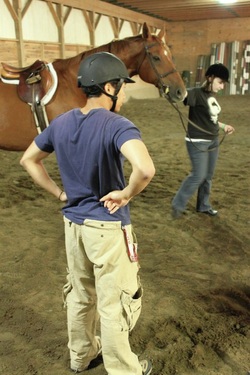 Recently I took up equestrian in my spare time. While spare time doesn't really amount to much these days, it's still plenty enough time to have the fun one desires and forget the work that awaits you upon your return.
Why? Well, I've always wanted to work with horses. Unfortunately, I really didn't have the opportunity or time growing up to partake in such, *ahem* hoity-toity activities. Honestly, that is the perception many people have of those who ride horses.
To some extent, the belief is warranted. Many people who deal with horses regularly have access to financial resources most of us could only dream of. For instance, the barn I train at currently normally charges $50 for a group lesson. That adds up quickly. Thankfully, being a member of the University squad licenses me to a hefty discount (thank you to the good people at RPI of course). Not to mention the equipment, the clothing, etc...
All in all, it's not a cheap activity.
With the discount in hand, I jumped into this new foray. I figured that my athletic background would help me pick it up quickly...kind of. I'm used to walking around on the balls of my feet. Anyone who has any experience with horses always remembers the "keep your heels down" mantra. I still struggle with that.
After my instructor realized I had a background in contact sports, she assigned me, with a little chuckle, this horse named "Buddy," a.k.a. "Bulldog." She told me the reason she picked this particular horse for me was that Buddy has an exceptionally long stride, which means his baseline walk and trot are pretty fast. Okay, very fast. Thus, he can be a little bit rougher on beginners who haven't quite figured out the horses rhythms and how to move with it.
For a while, it was like trial by fire, and as many people will tell you, this is the best way to learn. You learned the rhythms quickly, otherwise your nether regions will hate you later. Not to mention, having poor rhythm frustrates your steed. And trust me, you do not want to frustrate an animal as big as a horse, especially if you're sitting on it.
It seems as though over the last few weeks, with the requisite bumps and bruises along the way, that Buddy and I are beginning to work as a team. I feel almost spoiled by the relationship I have with Buddy, especially witnessing the struggle that some of my teammates have with their steeds.
One of the best things about Buddy is his stall etiquette. He's so calm, so relaxed, a beautiful thing for a beginner who's just learning how to tack quickly and consistently. While other horses seem to hate the process and let their respective riders know their feelings on the subject, Buddy seems to accept it with tacit annoyance. Understandable of course, considering you are strapping him with a bunch of leather so that you can essentially try to control him for the next hour or so.
Regardless, it makes everything easy, and most importantly of all, safe.
Getting used to Buddy has been excellent, especially considering the almost pre-natural match we have. Our instructor commented to me that me and Buddy are "excellent physical matches." Not sure what that meant at the time, but it's gradually becoming more clear to me. Buddy is a fairly young horse, and thus has all of this energy. He wants to jump everything. He wants to go fast. With the correct amount of coffee, we have a similar energy level, so we can mesh in that ultimately, I also want to jump everything, and go fast.
But I must say, the most enjoyable thing I've learned about riding are simple moments with your horse. One of the days after my ride, with Buddy strapped to the walls so I could untack him, whenever I walked away he would try to follow me, only to be held back by his straps.
Maybe he was just trying to make a dash, and had nothing to do with horse-rider relationship. Regardless, even if it is delusory, I like to think that somehow we're getting used to each other.
Today as well, brushing him down at the end, standing in front of him and touching the top of his head... Buddy would look at me with a comfort that wasn't there a few weeks ago. For a few moments, he stuck his nose in my chest...and proceeded to leave a big wet spot in the middle of my shirt.
Thanks Buddy. Glad to see I'm a human kleenex to you.
Never been prouder to be a human kleenex before.
Words are a fascinating little thing, the constituents of communication. We use them for everything, from ordering a hamburger to ordering our two-year old off the coffee table. They can be poetic, or they can rough. They can be fluid, or they can be broken. They can make sense in particular arrangements, be totally impossible to understand in others, and covering every space in between those two ends.
I'm thinking these days about emotionally loaded words. Consider some classics:
adore
kiss
hold
touch
l#ve (censored for the faint of heart. it is a four letter word after all)
This five words are a tiny fraction of words that could have significant emotional meaning. Of course, emotional meaning is contingent upon pragmatic factors. For instance, to say "I adore donuts" has less emotional weight than expressing the same verb to take as its object a person of particular value to you (save for donut junkies. You know who you are). However, when placed in the emotional environment as I just did, many of us can already picture moments from their past where these words went beyond simply a lexical definition that fit into a grammatical framework.
These little pieces, little building blocks, when in the right place both grammatically and pragmatically, have invisible strings that tie themselves to parts of us we have little conscious access to. We do not even need to put them in particular concrete contexts to feel something about these words, something intuitively special about their usage and their weight.
We can say things are only words, but we all should know better. Yes, in some sense they are only words. My very first car was, well, only a car (and honestly, not a very good one at that). However, just its place in my memory makes that car more than just a car to me. It's something personal to me, more important than just another car I may see driving down the street.
I'm sure we all can relate in some way, and so it is with words. We all have very different experiences tied to words of emotional relevance, yet I hypothesize that they all generate similar feelings within each of us. On some level, we can all relate with each other about words of emotional weight.
So yes, they are only words. But words aren't just a means of communicating ideas. They are also a means of communicating emotions, desires, beliefs, and the things we hold dear and essential to the characteristics that make us who we are. Don't underestimate their weight.
|





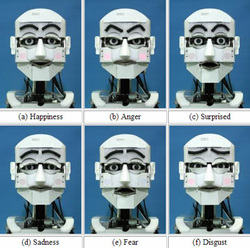

 RSS Feed
RSS Feed